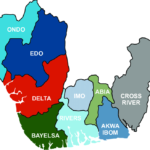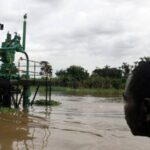New Oil Spill in Nigeria Contaminates Farmland and River, Affecting Communities in the Niger Delta
Shell facility spill exacerbates environmental pollution in the Niger Delta
Niger Delta, Nigeria – A recent oil spill at a Shell facility in Nigeria has caused extensive contamination of farmland and a river, disrupting the lives of fishing and farming communities in the Niger Delta. The region, which has long suffered from environmental pollution caused by the oil industry, is now facing another setback.
According to the National Oil Spill Detection and Response Agency (NOSDRA), the spill originated from the Trans-Niger Pipeline operated by Shell, which passes through communities in the Eleme area of Ogoniland. This region has been a focal point of local opposition to Shell’s oil exploration activities for many decades.
The exact volume of the oil spill has yet to be determined, but activists have shared images showing polluted farmland and water surfaces covered in oil sheens, along with dead fish trapped in the sticky crude.
While oil spills are unfortunately common in the area due to pipeline vandalism and inadequate maintenance, this incident is being described as a “major one” by activists. Fyneface Dumnamene, an environmental activist from the Youths and Environmental Advocacy Centre, stated that it is one of the worst spills in Ogoniland in the past 16 years and began on June 11.
Dumnamene added, “The spill lasted for over a week, spreading into the Okulu River, which connects to other rivers and eventually flows into the Atlantic Ocean. It has affected multiple communities and displaced more than 300 fishermen.” He also mentioned that oil sheens have traveled approximately 10 kilometers (6 miles) further into the creeks near Port Harcourt, Nigeria’s oil hub.
Although the leak has been contained, the cleanup process has been hindered, according to Idris Musa, the Director-General of NOSDRA. Musa attributed the delay to protests by local residents but assured that engagement efforts are ongoing.
The impasse reflects the deep-seated mistrust and historical grievances in the Niger Delta, an oil-rich region predominantly inhabited by minority ethnic groups who accuse the Nigerian government of marginalization.
Despite Shell ceasing production in Ogoniland over 20 years ago due to deadly unrest sparked by environmental concerns, the Trans-Niger Pipeline still transports crude oil from other areas through communities in the region to export terminals.
The spill’s impact on farms and the Okulu River, which flows through communities, has yet to be effectively addressed. The Niger Delta’s riverine communities, abundant in oil resources, have experienced a longstanding cycle of mistrust, pollution, and allegations of marginalization, ultimately depriving residents of clean water, harming farming and fishing activities, and heightening the risk of violence, as highlighted by activists.
NOSDRA recorded a total of 822 oil spills in 2020 and 2021, resulting in 28,003 barrels of oil being released into the environment.
You can always reach us through these channels Facebook: https:/www.facebook.com/ancitymedia Instagram: https://www.instagram.com/ancitymedia Youtube Channel: https://youtube.com/@ancitymedia
Phone Numbers: 07062501185, 09038738731 E-Mail: info@ancity.com.ng, anambracity@gmail.com Copyright. This Post: New Oil Spill in Nigeria Contaminates Farmland and River, Affecting Communities in the Niger Delta was approved and published by Ancity Media Editor and may not be republished elsewhere without prior written permission from the Editor. |
















